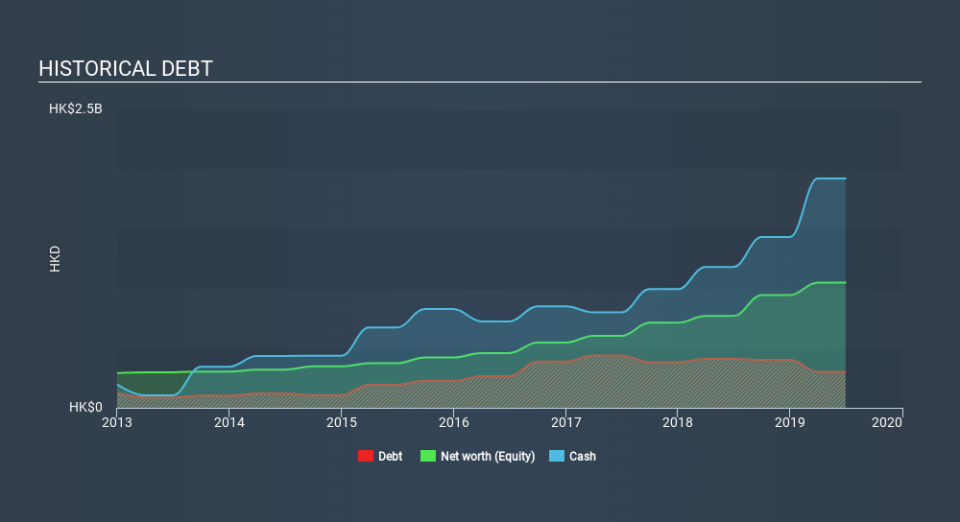Build King Holdings (HKG:240) Has A Rock Solid Balance Sheet

David Iben put it well when he said, 'Volatility is not a risk we care about. What we care about is avoiding the permanent loss of capital. So it might be obvious that you need to consider debt, when you think about how risky any given stock is, because too much debt can sink a company. Importantly, Build King Holdings Limited (HKG:240) does carry debt. But is this debt a concern to shareholders?
Why Does Debt Bring Risk?
Debt and other liabilities become risky for a business when it cannot easily fulfill those obligations, either with free cash flow or by raising capital at an attractive price. If things get really bad, the lenders can take control of the business. However, a more frequent (but still costly) occurrence is where a company must issue shares at bargain-basement prices, permanently diluting shareholders, just to shore up its balance sheet. Of course, plenty of companies use debt to fund growth, without any negative consequences. The first step when considering a company's debt levels is to consider its cash and debt together.
Check out our latest analysis for Build King Holdings
What Is Build King Holdings's Debt?
As you can see below, Build King Holdings had HK$301.1m of debt at June 2019, down from HK$410.1m a year prior. But it also has HK$1.92b in cash to offset that, meaning it has HK$1.62b net cash.
How Strong Is Build King Holdings's Balance Sheet?
Zooming in on the latest balance sheet data, we can see that Build King Holdings had liabilities of HK$3.60b due within 12 months and liabilities of HK$96.9m due beyond that. Offsetting these obligations, it had cash of HK$1.92b as well as receivables valued at HK$2.23b due within 12 months. So it can boast HK$452.8m more liquid assets than total liabilities.
This surplus liquidity suggests that Build King Holdings's balance sheet could take a hit just as well as Homer Simpson's head can take a punch. Having regard to this fact, we think its balance sheet is just as strong as misogynists are weak. Succinctly put, Build King Holdings boasts net cash, so it's fair to say it does not have a heavy debt load!
On the other hand, Build King Holdings saw its EBIT drop by 2.1% in the last twelve months. That sort of decline, if sustained, will obviously make debt harder to handle. The balance sheet is clearly the area to focus on when you are analysing debt. But it is Build King Holdings's earnings that will influence how the balance sheet holds up in the future. So when considering debt, it's definitely worth looking at the earnings trend. Click here for an interactive snapshot.
Finally, a company can only pay off debt with cold hard cash, not accounting profits. While Build King Holdings has net cash on its balance sheet, it's still worth taking a look at its ability to convert earnings before interest and tax (EBIT) to free cash flow, to help us understand how quickly it is building (or eroding) that cash balance. Over the last three years, Build King Holdings actually produced more free cash flow than EBIT. That sort of strong cash conversion gets us as excited as the crowd when the beat drops at a Daft Punk concert.
Summing up
While we empathize with investors who find debt concerning, you should keep in mind that Build King Holdings has net cash of HK$1.62b, as well as more liquid assets than liabilities. And it impressed us with free cash flow of HK$1.0b, being 147% of its EBIT. So is Build King Holdings's debt a risk? It doesn't seem so to us. Another factor that would give us confidence in Build King Holdings would be if insiders have been buying shares: if you're conscious of that signal too, you can find out instantly by clicking this link.
If you're interested in investing in businesses that can grow profits without the burden of debt, then check out this free list of growing businesses that have net cash on the balance sheet.
If you spot an error that warrants correction, please contact the editor at editorial-team@simplywallst.com. This article by Simply Wall St is general in nature. It does not constitute a recommendation to buy or sell any stock, and does not take account of your objectives, or your financial situation. Simply Wall St has no position in the stocks mentioned.
We aim to bring you long-term focused research analysis driven by fundamental data. Note that our analysis may not factor in the latest price-sensitive company announcements or qualitative material. Thank you for reading.


